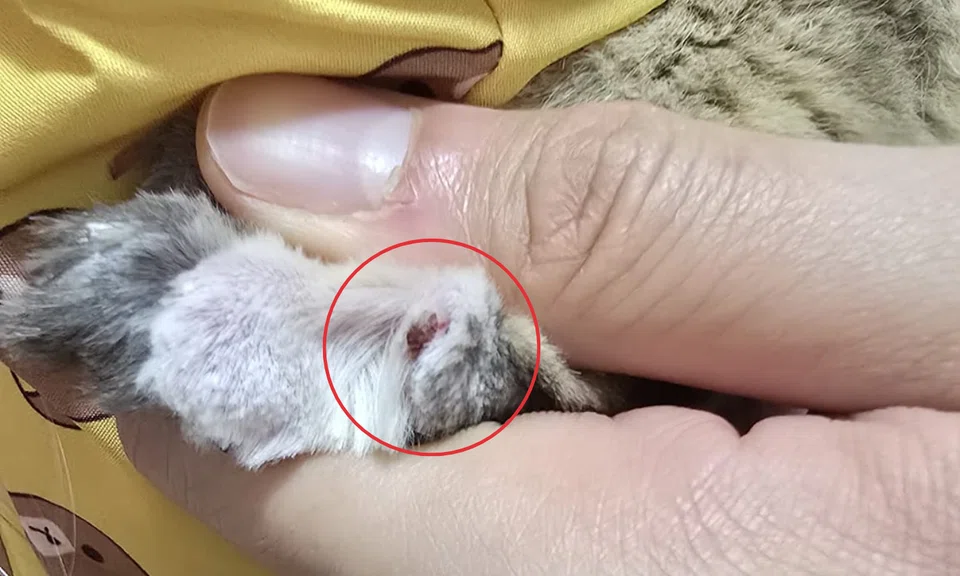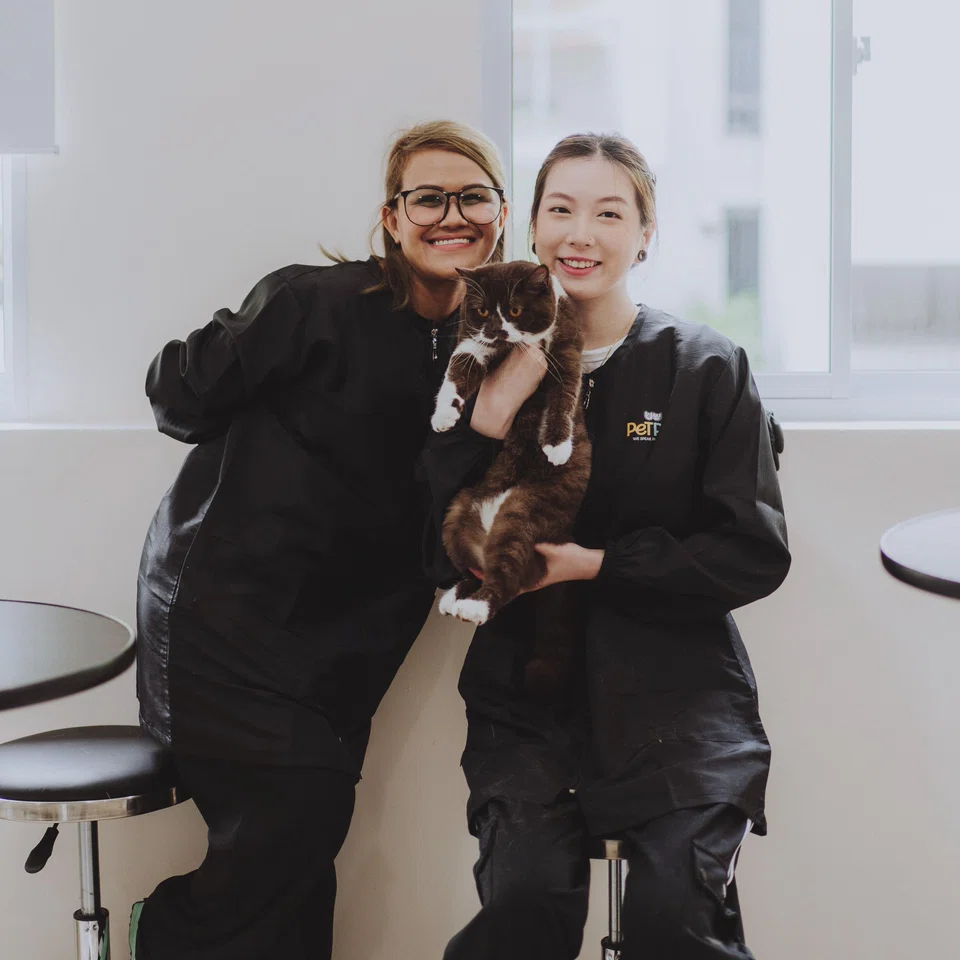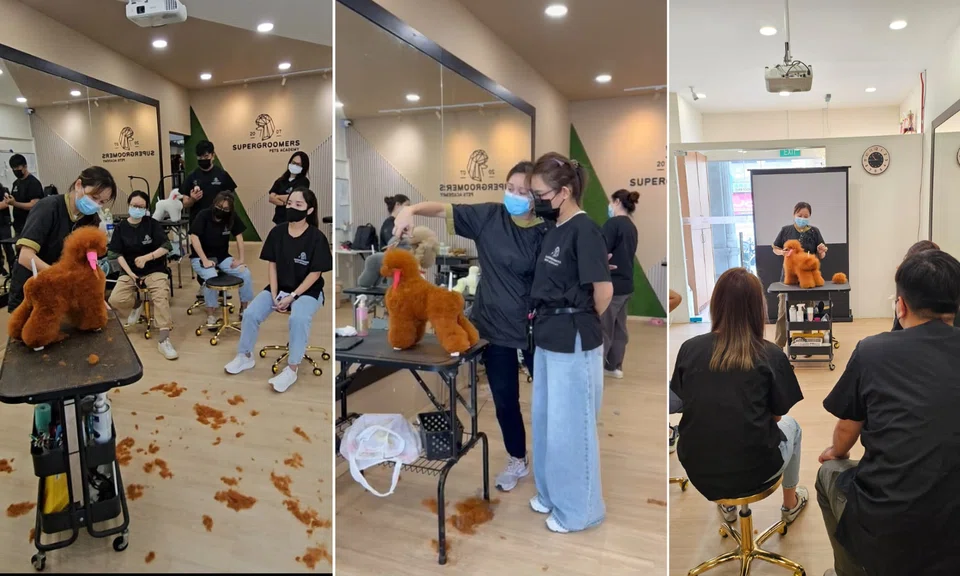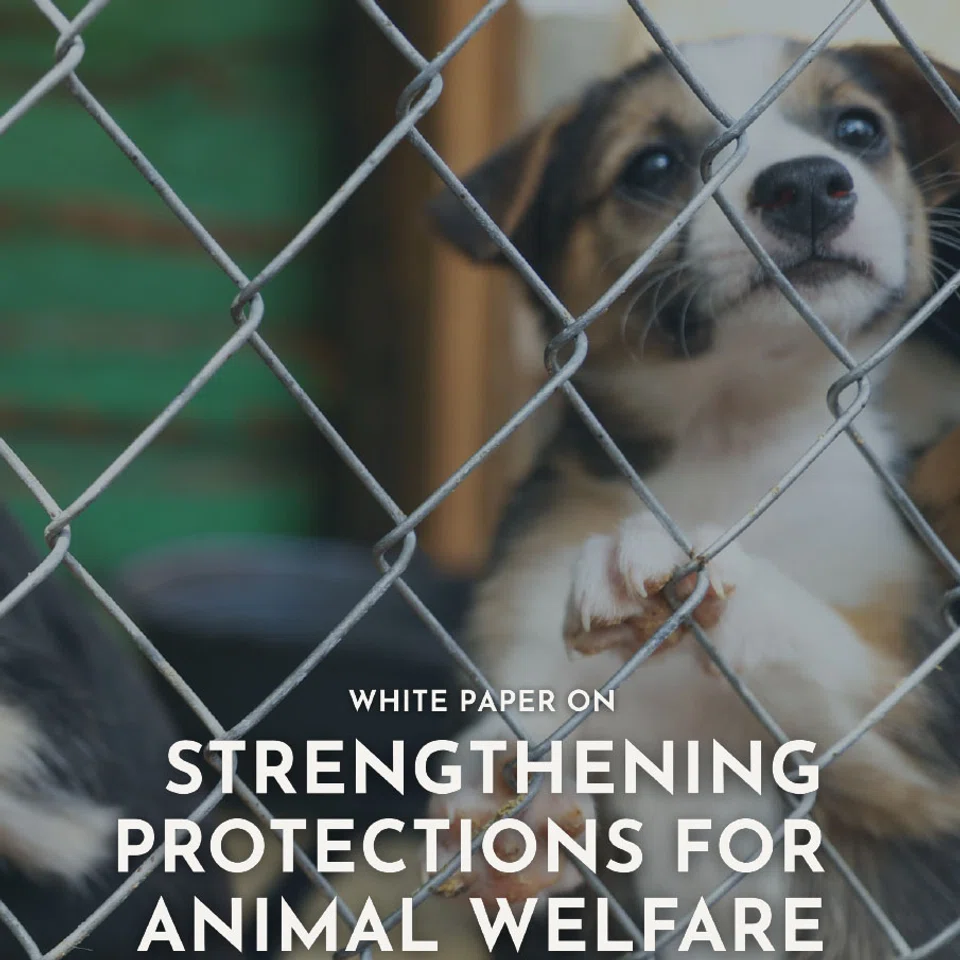Pus, bleeding nails, even death: Pet horror stories renew calls for tougher grooming regulations
A routine grooming session last year left a cat with pus, bleeding nails and cuts — one of several cases highlighted in the wake of heightened concerns following the high-profile death of poodle Buddy in October this year.
Stacey, who declined to give her full name, told Stomp that she discovered "pus, bleeding, and cuts" on her cat Bella after a visit to a grooming salon located in the east. The establishment, founded in 2018, offers cat grooming and sells pet supplies.
"Around 5.11pm, nearly two hours (after grooming began), I received a message from the salon owner stating that there was pus in one of my cat's nails. Concerned, we took her directly to the vet after picking her up at around 6.30pm," she explained.
According to Stacey, the vet told her that almost all of Bella's nails had been trimmed too short, causing them to bleed — something she believes was due to "improper handling or lack of skill".

In a Facebook post on Nov 25 last year, Stacey also claimed that an earlier session had left Bella with matted fur that had to be shaved off. Still, she decided to give the business another chance as she had been a frequent customer before.
She added that the salon responded "defensively" online when she raised the issue, and did not apologise.
A check with the post showed that the salon gave a detailed response in the comments section, strongly disputing Stacey's account and pointing out that it had spoken to the veterinary clinic multiple times.
It said the clinic "did not state, mention nor confirm" that Bella's injuries were caused by "excessive trimming", and that the vet was unable to determine the cause. Stomp has reached out to the business for comment.
Bella has since recovered, but her ordeal shows why many Singapore pet owners are on edge about grooming safety, especially in the wake of Buddy's death.
Concerns grow after Buddy's death
In late October, the death of poodle Buddy, who was sent for a routine grooming session at Pawsome Singapore, sparked renewed concerns over animal welfare and the lack of licensing regulations in pet grooming centres.
Since Buddy's owner, Tanya Dhillon, made public her accusations against Pawsome Singapore, another pet owner has also come forward, claiming her pug was injured at a boarding facility run by the same company.
According to its website, Pawsome is a pet grooming business founded in 2018.
Pawsome Singapore told Stomp it was "heartbroken" at the "truly sad" incident and confirmed that it is cooperating with local authorities investigating Buddy's death.
At press time, Pawsome Singapore's main Instagram page appeared deactivated, while its Facebook page continued posting updates on puppies for sale, including Pomskys and Border Collies. Several posts drew sharp netizen comments demanding answers about Buddy's death.
Ms Dhillon has since made an open call on her Instagram ahead of a meeting with Member of Parliament Jessica Tan, who oversees the Changi–Simei division of East Coast Group Representation Constituency.
In her post, Ms Dhillon asked other pet owners with similar grooming nightmare stories to step forward to establish a "long-standing pattern of animal harm" and the "gap between harm and justice".
At press time, at least four comments directed her to Instagram users, ostensibly run by pet owners with negative grooming experiences.
When asked, a spokesperson for animal welfare charity Causes for Animals Singapore (CAS) said that it has "observed a gradual increase in public complaints and feedback relating to pet grooming services in Singapore".
"These concerns often centre on issues such as rough handling, inadequate restraint techniques, insufficient understanding of animal behaviour by grooming staff," the organisation added.
'Never force restrain'
Foo Michelle, Principal and Chief Instructor of Supergroomers Pets Academy, feels that the safety issues reported in the news are mainly a result of "gaps" in companies' safety protocols.
The academy trains aspiring groomers in safe handling and grooming of pets, offering hands-on courses and internationally recognised certification.
"In my opinion there has to be an attending staff at all times when a pet is in the premises of the shop," said Ms Foo. This is a "fundamental principle" that she adopts in her own business.
She cites previous incidents — including the death of a corgi who hanged on its own leash in 2024, and a maltese who died similarly while its groomer was out on a smoke break in 2023.
Other safety issues commonly raised by pet owners include mishandling or lack of skills, as in Stacey's allegations.
Jen Toh, the bubbly founder and managing director of operations at PetPat, a cat grooming service, firmly believes that "every pet has their own personality", and the job of a professional groomer is to understand and respect that.

She prefers to use the term "defensive" instead of "aggressive" when describing cats who may have outbursts induced by anxiety.
When asked how PetPat manages more violent behaviour, Ms Toh stresses that they "never force restrain" cats, instead focusing on helping scared cats feel more "secure". Her team achieves this by offering treats or speaking to the cat in a soothing manner.
Similarly, Pet Lovers Centre (PLC), a major industry player, underscores the importance of grooming pets in their "natural state". PLC's groomers use only body-support leashes to prevent sudden falls, and all dryer use is closely monitored and regulated to prevent accidental overheating.
"We do not practise sedation for grooming," a PLC spokesperson emphasised.
Where education is concerned, Ms Foo shared that to be a qualified pet groomer with Supergroomers Pets Academy, potential groomers must "minimally" complete a 420-hour course conducted over a period of 70 days.

The course covers both basic and advanced dog grooming skills and culminates in assessments on dummy and real dogs.
The certification is recognised internationally and locally, as the examinations follow standards set by the International Canine Federation.
As the Singapore representative of the International Society of Feline Cosmetologists, PetPat also offers globally recognised certification courses that educate potential cat groomers on safe, humane, and low-stress handling techniques for cats.
Ms Foo, Ms Toh and PLC all emphasised the need for regular refresher courses to ensure groomers are updated on latest trends and best practices.
Yet, certification is but a 'self-imposed' requirement
In response to Stomp's queries, Jessica Kwok, Group Director, Industry Standards & Regulatory at Animal & Veterinary Service (AVS), confirms that there are licensing regimes for vets, pet shops and farms, pet boarders, and pet breeders — businesses AVS considers to pose "higher levels of risk for animal health and welfare".
"While there is currently no licensing regime for pet groomers, all animal-related businesses are bound by the Animals and Birds Act," says Ms Kwok.
She adds that these businesses and their staff are "expected to uphold higher standards of animal welfare", as owners have entrusted their pets to them.
"The Code of Animal Welfare (for the Pet Industry) sets out minimum animal housing, management and care standards for pet businesses, including pet grooming facilities," continues Ms Kwok. "Failure to meet minimum standards stipulated in the Code may be used as evidence for enforcement action."
Animal welfare organisations say guidelines alone are not enough and are calling for licensing and legislation.
The Society for the Prevention of Cruelty to Animals (SPCA) told Stomp that the "lack of licensing for pet groomers and trainers constitutes a critical gap that is dependent on the practice of the individual handling the animal, sometimes placing the animal in a vulnerable situation".
In collaboration with Animal Concerns Research and Education Society (ACRES), SPCA has produced a White Paper on strengthening protections in animal welfare. One key recommendation from both organisations is mandatory licensing conditions for pet groomers and trainers.

CAS echoes the sentiment, urging authorities to do more to protect animals in grooming establishments. The charity calls for greater regulation and oversight by NParks, a centralised complaint and response system, and mandatory groomer certification.
What can owners do individually?
Even if the push for licensing regulation gains traction, legislative changes do not happen overnight. What can 'pawrents' do to ensure their 'furkids' are in reliable hands?
Lim, a student who declined to give her real name, said that after discovering scabs around her dog Konbu's head following a grooming session, she finds it "hard to trust" grooming services and is now a lot "more cautious".
She now reads reviews on "multiple platforms" and seeks recommendations from people she knows to feel more "assured".
Ms Toh of PetPat, who has pets herself, understands the trust issues owners may face. She suggests that pet owners research salons carefully, checking factors such as the groomers' certificates or educational qualifications and how long the business has been operating.
As owners may have limited knowledge of proper grooming and handling, Ms Toh believes that "proper professional grooming" is still important for pets' well-being.
Ultimately, it takes a village to ensure pet safety.
PLC says that safety is a "shared responsibility" – groomers must continuously upskill and follow strict protocols, and pet owners should provide accurate information on their pet's health, temperament, and behavioural triggers.
Industry bodies and the authorities can support through "clear guidelines and avenues for standardisation".
Ms Kwok of the AVS shares, "The public has an important role to play in encouraging pet-related businesses to raise their standards by patronising responsible ones", and added that people should also report errant operators to AVS for investigation.

See something interesting? Contribute your story to us.
Explore more on these topics

